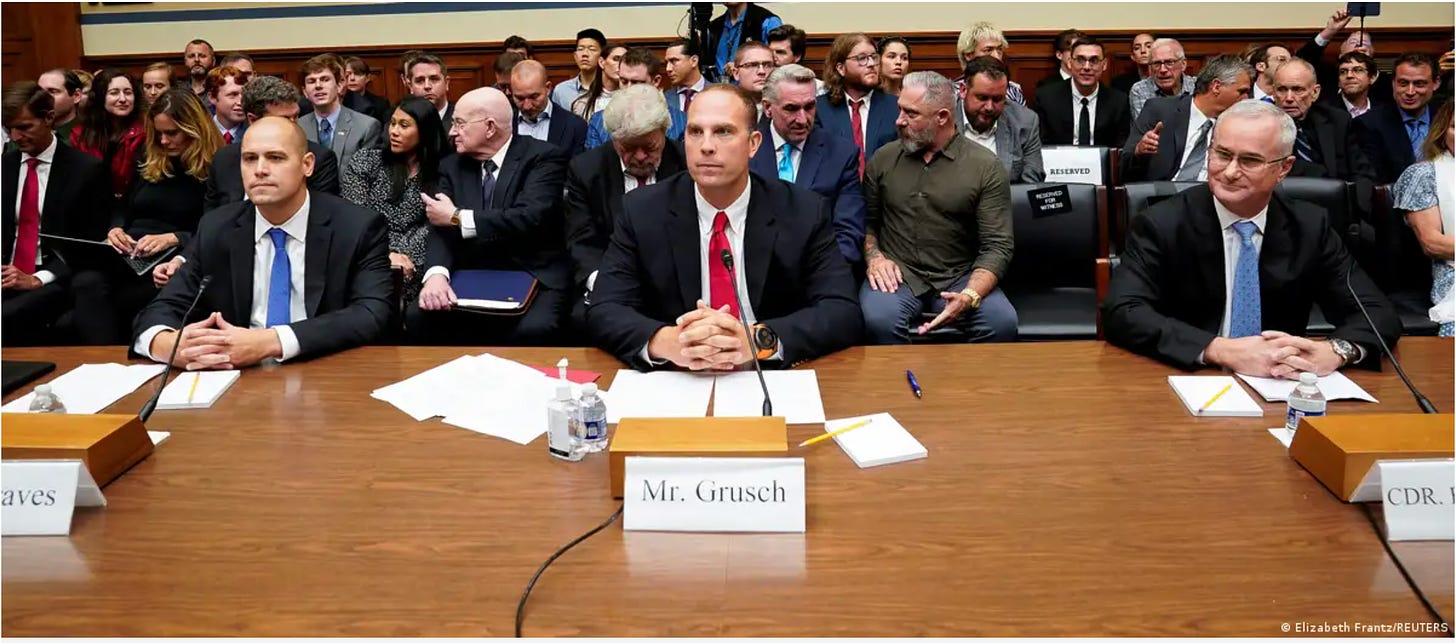This morning, I awoke to find a blurby article in my inbox making fun of me for my belief in UFOs. The article is from UpRoxx and is entitled “Michael Ian Black Didn’t Even Joke About UFO Hearing,” and goes on to cover yesterday’s Congressional UFO hearing in the barest of terms, singling me out as somebody gullible enough to fall for the Congressional testimony, under oath, of two naval aviators and a former high-ranking intelligence officer.
The reason I mention this at all is to illustrate the stigma that still surrounds this topic. Even after yesterday’s historic bipartisan hearing in the House, the first of its kind to be held in 60 years, expressing a sincere interest in the mysterious craft that are flying around our skies and in our waterways evokes kneejerk snarkiness and derision. This, despite the fact that our government has acknowledged the existence of these craft, there are mountains of supporting documentation, and legislator from both side of the aisle are crafting legislation to better understand what’s going on. When you’ve got both Alexandria Ocasio-Cortez and Matt Gaetz in the same hearing treating the subject seriously, why does the stigma remain?
Ridicule is one of the main reasons more witnesses, particularly those in the military, do not come forward. As testified to yesterday, any aviator who reports witnessing anomalous phenomenon risks serious career damage. Shortly after the hearing, a friend of mine wrote to me in a private message that she used to be married to an Air Force fighter pilot, and that he once “saw something once that wasn't anything from any air force on this earth.” When I asked if he described it to her, she said he couldn’t because “he couldn’t talk about it.” Ryan Graves, one of yesterday’s witnesses estimated that 95% of all pilot sightings go unreported. He further testified that the best thing any pilot who witnesses inexplicable aerial phenomena can do is forget it. David Grusch, the intelligence officer who testified yesterday that the United States is in possession of recovered craft and “bilogics” (non-human occupants) said he has experienced “brutal” personal and professional reprisals. It was those reprisals that led him to file a whistleblower complaint, which the Inspector General found “credible and urgent.”
The subject of stigma and ridicule extends past this narrow topic and speaks to something deeper in the human psyche, the desire for conformity. People who express atypical beliefs risk a lot. Of course, a lot of times those beliefs are demonstrably false. Sometimes those beliefs can even be damaging. See: Kennedy, Robert Jr.
Fortunately, we’ve developed systems for separating the guff from the gospel. One can apply the scientific method to the topic of UFOs the same way we can with vaccines. First, we collect evidence. That’s what’s going on now. The problem with this particular subject is that much (most) of the evidence surrounding UFOs is classified, making it unobtainable to the general public. That’s why Chuck Schumer recently introduced legislation “which would increase transparency around Unidentified Anomalous Phenomena (UAP) and further open scientific research.” Why is the leading the Senate Majority Leader, along with his Republican counterpart Mike Rounds, introducing legislation on this inflammatory subject if there’s nothing there? The legislation itself is evidence.
With enough evidence we can begin to make assessments about what it is we’re observing. At this point, all we can say for certain is that unexplained craft are in our skies and seas. We do not know where they come from, but we can reasonably assess that they are neither ours nor the products of our adversaries. For those who believe the most likely explanation is that they come from Russia or China, consider that these craft demonstrate flight characteristics that defy our current understanding of physics. How is it possible that Russia, for example, is getting their asses kicked in Ukraine if they have mastered a new physics? Once you have ruled out the most obvious explanation, you inevitably have to start looking for more exotic explanations.
That’s where we are today.
Naturally, people are going to scoff when the talk turns to extraterrestrials. Of note, nobody in the hearing yesterday claimed to know the origin of these craft. Those in the UFO community have many possible explanations, ranging from ETs to the interdimensional to the intertemporal (time-travelers). Yes, some of these explanations are so exotic that they strain credulity. Unfortunately, at this point no hypothesis, no matter how outlandish, can be dismissed, because without further evidence and rigorous scientific study, we cannot eliminate any possibility. Which is why we have to reduce the stigma. Just as aviators risk their professional reputations by reporting what they see, scientists and academics risk their own careers by studying this phenomena.
Consider the case of astrophysicist Avi Loeb, who became interested in this topic after the 2017 flyby of an interstellar object dubbed Oumuamua, a Hawaiian word meaning “messenger” or “scout.” The object was the first object definitively attributed to arriving in our solar system from another. It was a long, flattish object that exhibited peculiar physical characteristics and behaviors. No scientific consensus has ever been reached about the nature of this object, although most astronomers believe it to be no more than an odd asteroid. Dr. Avi Loeb, however, theorized that Oumuamua was most likely a piece of extraterrestrial technological debris, possibly a “light sail.” He published a paper on the subject, followed by a book. Dr. Loeb, an accomplished astrophysicist and former director of the Harvard Astronomy Department, was subjected to ridicule, scorn, and derision. Rather than backing down, Dr. Loeb has doubled down, launching the Galileo Project, which seeks further evidence of interstellar objects. He recently returned from the coast of Papua, New Guinea where he collected microscopic spherules from a candidate for the first interstellar object to be found by humans. These spherules, he speculates, may indicate that the object is more than a meteor: it may be technological. The small orbs he collected from the ocean floor are now being analyzed by a handful of labs across the country to determine their chemical composition, which may give some clue as to whether they are natural or technological in nature. In other words, he’s following the scientific method. So why is he the subject of withering articles like this one in the New York Times?
He talks about science itself as being in a state of crisis:
Science is not about us; it’s not about empowering ourselves or making our image great. It’s about trying to understand the world, and it’s meant to be a learning experience in which we take risks and make mistakes along the way. You can never tell in advance, when you work on the frontier, what is the right path forward. You only learn that by getting feedback from experiments.
Which is the other problem with science today: people are not only motivated by the wrong reasons; they are also no longer guided by evidence. Evidence keeps you modest because you predict something, you test it, and the evidence sometimes shows you’re wrong.
Exactly. Sometimes you’re wrong. But you don’t know unless you test your theories. Do we really want to dismiss the conclusions of highly-credentialed professionals simply because their explanations for unconventional subjects defy conventional wisdom? Of course not. Yet, on this subject, that has been the default setting for decades. So who ends up filling the vacuum? A lot of cranks. Which only sets back the advancement of our knowledge further. In this way, stigma becomes a self-reinforcing negative feedback loop.
I’m not saying I know anything definitive about UFOs. Like most people, I don’t have a clue. I do know that it’s the most fascinating mystery on Earth. I know that the conventional wisdom has been proven wrong. I know that it touches on fundamental notions of who we are, where we come from, and where we’re going. I know those questions frighten people. The explanation, if we ever find one, may frighten people more. But we’ll never get anywhere if we continue to demean those struggling to find answers. What I don’t know is where any of this takes us next. Whatever the explanation, it will be fascinating. As Sherlock Holmes once said, “When you have eliminated all which is impossible then whatever remains, however improbable, must be the truth.”
Make fun of me all you want.






Anyone who is still mocking this subject is either not paying attention or being willfully ignorant.
Next thing you know, you’ll start advocating against closing libraries and banning books. Seriously, you’re asking the same questions most intelligent and educated people have been asking all my life, and way before.